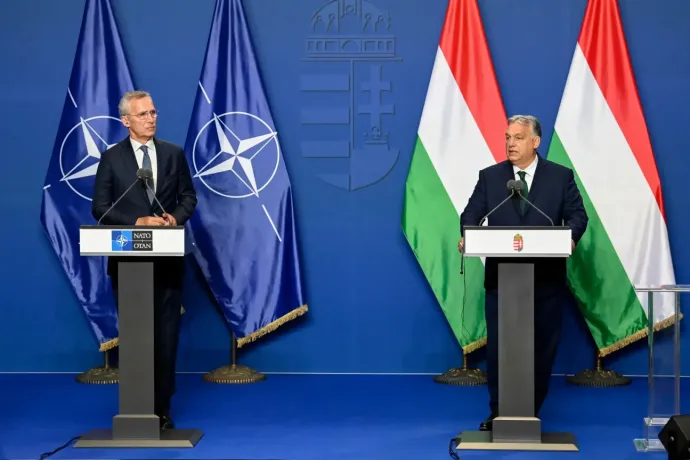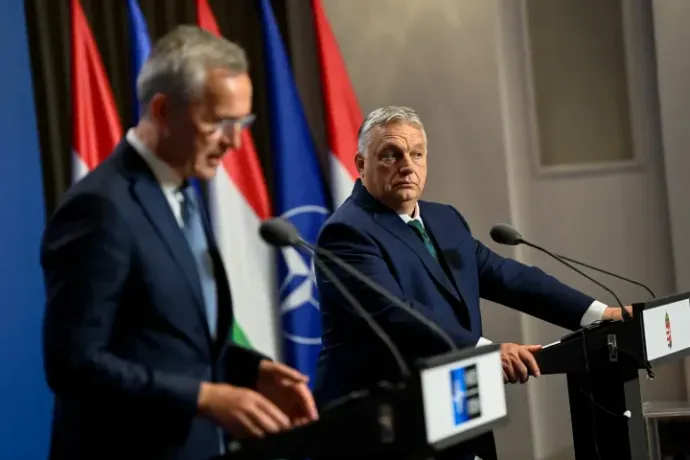Orbán to Stoltenberg: Hungary has different views on Ukraine, but will not block majority decisions

According to the Hungarian Prime Minister, Hungary received a strong guarantee during the NATO Secretary General's visit to Budapest that it would not need to get involved in the war Russia launched against Ukraine. In fact, Hungary has not been under any obligation to do so until now either. As Jens Stoltenberg also pointed out, this is the norm in accordance with NATO's founding documents, but he takes note that Hungary is not participating in NATO's efforts to provide financial, training and military assistance to Ukraine.
"I welcome our Secretary General, who has a high reputation in Hungary for well-known reasons. I am glad that cooperation between NATO and Hungary has been strengthened under his leadership", Viktor Orbán said at a joint press conference with NATO Secretary General Jens Stoltenberg in Budapest. The meeting between Stoltenberg and the Hungarian Prime Minister came as a surprise to the public, although it should come as no surprise in itself, given that the Hungarian government's position on Russia's war against Ukraine is very different from that of most NATO members, making the meeting justified. Stoltenberg himself had previously said that he was looking forward to talks with Orbán.
Last Friday, when speaking on public radio, the Prime Minister also alluded to an upcoming meeting with the Secretary General, when he said: "What I see is that we have learned how to withstand pressure from Brussels, Hungary knows how to defend its independence. NATO is a more difficult matter though, so the NATO Secretary General will be coming here too. As I see it, we must definitely stay out of what NATO is calling "the Ukrainian mission".
Speaking about Ukraine at the press conference, Orbán said:
- Hungary's position differs from that of most NATO member states on how to reach peace, but Hungary acknowledges that the weight and number of opinions differing from ours is significant.
- However, it does not have the ability nor the strength to change the large number of opinions differing from its own.
- Hungary does not wish to block decisions in NATO that other member states are calling for.
Stoltenberg reacted in a similar spirit, although he indirectly hit back at Orbán, who had accused Western governments of being pro-war:
NATO's goal is to prevent war, he said. He said there is no dispute within NATO that the alliance is capable of protecting its members, which is what it has been doing for 75 years, “ensuring peace and prosperity for the whole continent.”
On Ukraine, he said NATO is determined to provide training, long-term financial and military support to Ukraine, "but recognizes that Hungary is not going to participate in these efforts." At the same time, NATO's decision to do so “will not be blocked.”
According to Orbán, Hungary has received guarantees that it will not have to get involved in the war – although no member state can be compelled to do so under NATO's founding documents, and Stoltenberg also noted that initiatives outside NATO are always voluntary, based on the individual decisions of member states.
Only two questions allowed
Only two questions were allowed at the press conference. The reporter of the Hungarian public TV channel M1 asked Orbán what guarantees that Hungary would not get involved in the war later either. Orbán said the guarantee was the word of the Hungarian government and of Jens Stoltenberg.
"We are not children, there is no point in deluding ourselves," he said, adding that "Russia's invasion of Ukraine, which has led to an extremely difficult global political situation, has raised difficult questions", clearly naming Russia as the initiator of the war.
However, he said, “the difficult period is not over, there will be more difficult moments when decisions will be taken that will be related to Hungary's involvement in the war.”
Reuters asked Stoltenberg what he thought of Foreign Minister Péter Szijjártó's description of NATO's help for Ukraine as a mad act. The secretary-general said that NATO has 32 member states and it is natural that there will at times be differences of opinion, “but we have proven many times that we can rise above them.”
According to him, the other members of the alliance have agreed to increase NATO's role in training and supporting Ukraine, “along with accepting that Hungary will not participate in this.”
True, this is not an obligation, and there is no such obligation in NATO's founding documents, Stoltenberg underlined, indicating that
what Orbán calls a confirmed guarantee was in fact already available to all NATO members.
There is no doubt, however, that this will bring the diplomatic disputes between the Hungarian government – which has been voicing opinions different from those of NATO for some time and which held off on aggreeing to Sweden's NATO accession until the very last moment – and NATO to a temporary standstill. At the end of the press conference, the parties left the room quickly along with all the members of their delegations, thus avoiding further questions from journalists.
No mention of Hungary being barred from B9 talks
Stoltenberg arrived in Budapest after attending a meeting of the Bucharest Group of Nine (B9), a group of NATO and EU member states from Eastern Europe.
The Financial Times had earlier reported that diplomatic sources had hinted that
excluding Hungary from the meetings of the alliance over its constant vetoing of decisions about helping Ukraine was being considered.
The possibility of Hungary being barred from talks of the B9 was not mentioned at the brief press conference.
The group was founded in 2015 by Bulgaria, the Czech Republic, Estonia, Hungary, Latvia, Lithuania, Poland, Romania, Slovakia and Estonia – NATO and EU member states that were all part of the Soviet bloc before 1991. The organization does not have an independent institutional structure, but rather functions as a forum where members' heads of state and government, defense ministers and foreign ministers can coordinate their security policy ideas – particularly in light of the Russian threat, which has been an acute concern since 2014. However, at recent B9 meetings, Hungary has consistently vetoed decisions about supporting Ukraine and speeding up the process of its potential accession to NATO;

Many of NATO's easternmost members have expressed concern about Russia's attempts to regain influence in the region, as they can still very much remember living under Soviet influence.
Orbán had built the campaign leading to last Sunday's EP elections on the premise that anyone who does not vote for Fidesz is voting for war, essentially suggesting that if the parties running against Fidesz were to win, Hungarian troops would be sent to the Ukrainian front as a result of NATO's decision. Speaking in Helsinki a few days ago, Stoltenberg reiterated that NATO has no plans to send troops to Ukraine.
Orbán sees Ukraine as a buffer zone. "Whether the Ukrainians like it or not, Ukraine is where it is on the map. The best perspective would be for it to be a buffer zone between Russia and the West." He has said that Ukraine and Georgia could have been admitted to the EU and NATO in 2008, but that opportunity was missed, and since then, Russia has become stronger and it is clear that it will not let this happen now. "Russia will destroy Ukraine again and again and again and again. Russia will never accept an EU and NATO member like Ukraine on its doorstep. Never." the Prime Minister said back in February.
A member of the NATO delegation had to apologize to Kyiv once before
Orbán and Stoltenberg's press conference was attended by both parties' delegations.
From the Hungarian side, these were:
- Péter Szijjártó, Minister of Foreign Affairs,
- Minister of Defence Kristóf Szalai-Bobrovnitzky,
- István Balogh, Ambassador of Hungary to NATO,
- Balázs Orbán, Chief Political Advisor to the Prime Minister,
- János Máté, State Secretary, Head of the Prime Minister's Programme Office
- and, in the newly created position of Chief National Security Advisor to the Prime Minister, Marcell Bíró, whose appointment required an emergency government decree to allow him to shorten the time limit after his resignation from his previous post so that he could take office immediately.
From the NATO side, the delegation included:
- Allison Hart, Deputy Head of the Human Security Unit at NATO
- Gjermund Eide, Military Advisor to the Secretary General,
- Farah Dakhlallah, NATO Spokesperson
- and Stian Jenssen, the NATO Secretary General's Chief of Staff, who had to apologize to Kyiv last summer after suggesting that Ukraine should agree to give up part of its territory currently occupied by Russia if it wanted to join NATO.
For more quick, accurate and impartial news from and about Hungary, subscribe to the Telex English newsletter!